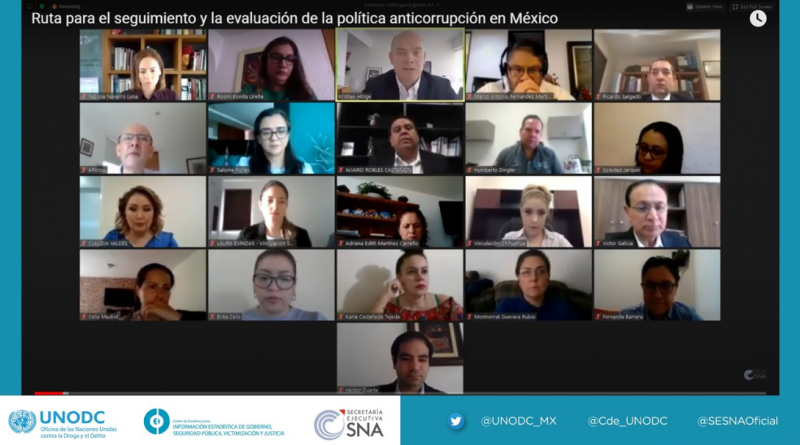Center of Excellence UNODC-INEGI organizes jointly with SESNA a virtual panel on the monitoring and assessment of anticorruption policies
The gLocal Evaluation Week 2020 is the sixth edition of a series organized by the Center for Learning on Evaluation and Results for Latin America and the Caribbean (CLEAR LAC). The 2020 version has an international reach receiving proposals from more than 17 countries in the region, hosting more than 700 activities and with an estimated turnout of more than 30,000 participants. Additionally, the United Nations Office on Drugs and Crime (UNODC) is, for the first time, partner for the diverse number of activities taking place between June 1st and 5th.
Besides its role as a promotor of the Evaluation Week, speakers from UNODC in Mexico will participate in two different events. The first took place on June 3rd in the digital roundtable “The roadmap for the monitoring and evaluation of anticorruption policy, and contributions from international experience.” The panel was organized jointly with the Executive Secretariat of the National Anticorruption System (SESNA for its Spanish acronym). The panel received attention from assistants from the government, academia and members of the public. Such interest reflected in the online transmission of the event, which welcomed more than 300 views.
The event had the presence of Kristian Hölge, Representative of UNODC for Mexico, who inaugurated the session by highlighting the challenge of measuring corruption in an objective and reliable basis. Later, Salome Flores, coordinator of the Center of Excellence UNODC-INEGI took the floor to explore the role of public policy measurement and evaluation in the United Nations Convention Against Corruption (UNCAC) and the 2030 Agenda for Sustainable Development. One of the takeaways of her presentation was the importance of joint efforts and coordination among relevant actors involved in the production of corruption statistics and indicators, which are the keystones for policy assessment.
Additional to this international perspective, staff from SESNA showcased the design of a collection of indicators on corruption in Mexico- called the Module for Monitoring and Evaluation on Corruption (MOSEC for its Spanish acronym), which will follow-up progress on the National Anticorruption Policy and assess the performance of the institutions part of the National Anticorruption System (SNA for its Spanish acronym). Reacting to this Project, the panel benefited from the valuable comment from scholars from prestigious institutions in Mexico such as CIDE, ITESM, UNAM and the Citizens Participation Committee for the SNA. The overall result was an in-depth and interesting discussion in which the spirit of constructive criticism prevailed. The lessons that came from the panel will also help to enrich the design and implementation of an anticorruption policy in Mexico. In particular, it remains essential to bear in mind the main challenges of generating information and building indicators for corruption. The relevance of a strategical approach based on performance assessment was also brought up as a necessary element to deal with a complex public problem such as this one.
Available video of the roundtable (in Spanish)
Details and registry for other events in the Evaluation Week in which UNODC will be involved



